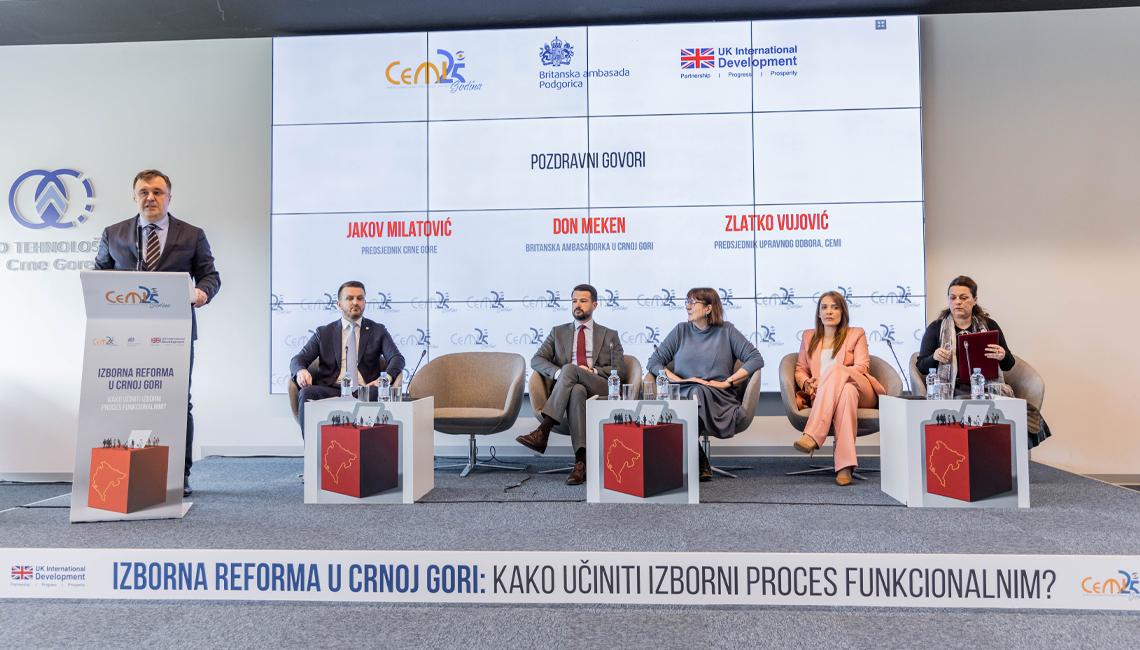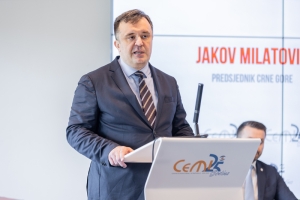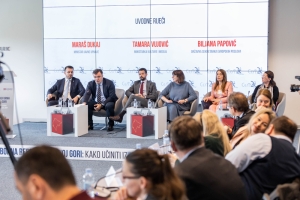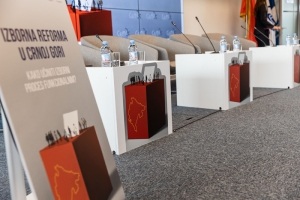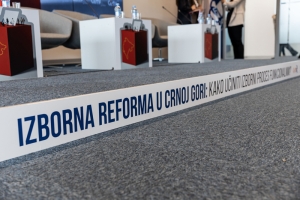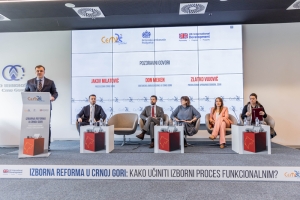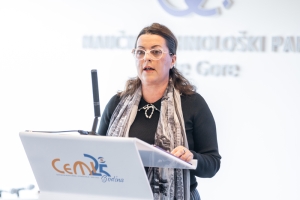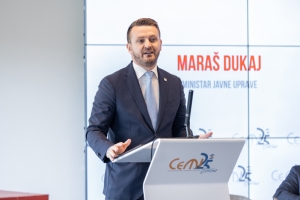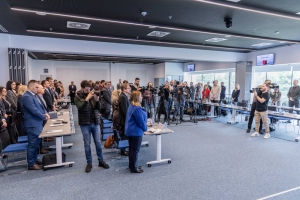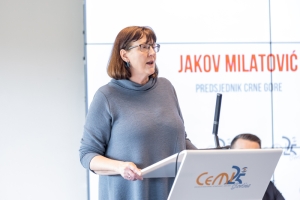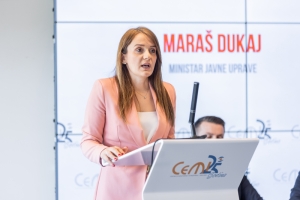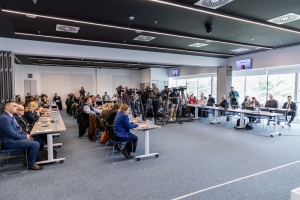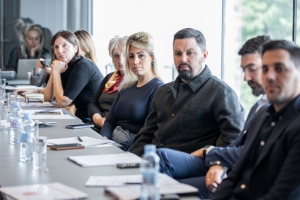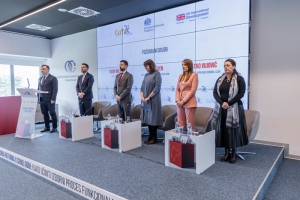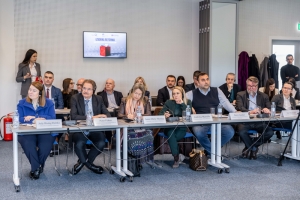Electoral reform is crucial for strengthening democracy, restoring citizens’ trust in institutions, and accelerating Montenegro’s European integration. Given that reforms are a prerequisite for EU membership by 2028, the country no longer has time for political deadlock.
This message was emphasized in the opening remarks at the conference “Electoral Reform in Montenegro: How to Make the Electoral Process Functional?”, organized with the support of the British Embassy in Podgorica.
The President of the Governing Board of CeMI, Zlatko Vujović, stated that the conference on electoral reform, initially scheduled for February, was postponed to allow more time for reaching an agreement between the government and the opposition and to facilitate the renewal of political dialogue.
„We could not have anticipated that the conference would coincide with the first day of the opposition’s return to Parliament, but this presents a valuable opportunity for a more open and direct discussion. Our objective has always been to foster dialogue and facilitate an agreement between the government and the opposition on electoral reform,” Vujović stated.
He emphasized that electoral reform is a critical milestone in Montenegro’s European integration process and that its completion by the end of the year is essential for the country to remain on the EU accession agenda and achieve membership by 2028.
“Progress on electoral reform has been minimal, and I say this as an associate member of the Parliamentary Committee on Comprehensive Electoral Reform. However, the necessary steps are clear, as are the solutions based on European best practices. The primary requirement now is strong political will to implement these reforms, as most of the outstanding issues are of a technical nature,” Vujović stressed.
He acknowledged the efforts of Montenegrin President Jakov Milatović in initiating discussions on open lists, as well as the engagement of Minister of Public Administration Maraš Dukaj in addressing local election-related matters.
Additionally, Vujović underscored the importance of separating local and parliamentary elections to prevent prolonged electoral uncertainty, which hinders the timely adoption of critical national policies.
British Ambassador to Montenegro, Dawn McKen, reaffirmed her support for the recently reached agreement to continue electoral reform efforts through the end of 2025.
Electoral reform in Montenegro is of critical importance and a key prerequisite for further progress on the path to EU membership. However, this is not just a technical requirement for accession—it is a fundamental political obligation. The need for reform is not dictated solely by the European integration process; it must be recognized as a responsibility shared by all political actors in Montenegro,” stated British Ambassador Dawn McKen.
She emphasized that both the government and the opposition must take an active role in reaching consensus and finding a path forward, stressing that the reform process must be guided by the recommendations of the OSCE and ODIHR.
“Reforms must be transparent and inclusive, ensuring the participation of civil society, the academic community, and other relevant stakeholders and experts,” McKen underscored.
“The British Embassy in Podgorica remains firmly committed to supporting Montenegro’s democratic and European trajectory. We strongly back the efforts of civil society organizations in establishing the necessary conditions for free and fair elections. I look forward to seeing all political actors demonstrate the commitment needed to swiftly implement essential reforms,” she concluded.
President of Montenegro, Jakov Milatović, recalled that in December of last year, he proposed electoral system reform through the introduction of open lists, thereby initiating a high-level dialogue that included national and regional experts.
He pointed out that Montenegrin citizens had more open electoral lists in 1905 than in the 2023 elections, which, in his view, reflects a democratic regression.
“Our goal remains unchanged—to ensure that it is the citizens who make the decisions, not party elites,” Milatović stressed.
He underscored that elections are not merely a procedural formality but a fundamental mechanism through which citizens exercise their will and shape the development of both society and the state.
“If voters feel that their voices carry no real weight, Montenegro must critically reassess the kind of democracy it is building,” he warned.
Milatović also pointed to research showing that political parties are the least trusted institutions among Montenegrin citizens, emphasizing that “this is no coincidence.”
“The current system of closed lists allows political parties—not the voters—to determine who becomes a member of parliament. The introduction of open lists would strike a decisive blow against partitocracy and dismantle closed political circles,” he concluded.
Referring to Article 2 of the Constitution of Montenegro, which stipulates the direct exercise of power, the President emphasized that citizens must have this authority not only in presidential elections but also in parliamentary and local elections.
“Open lists are not a privilege; they are a constitutional right of the citizens. Montenegro no longer has time to wait. The people want a system that listens to them, not one that ignores them,” Milatović stated.
The President announced that if there is no political will to adopt open lists, he will use his constitutional powers to propose a referendum on the matter.
“Those who oppose open lists should stand before the people and explain why they believe citizens should not directly elect their representatives. If they are right, let them prove it to the voters. If they are not, let them step aside in the face of the people’s will,” Milatović asserted.
Minister of Public Administration, Marash Dukaj, emphasized that as the ministry responsible for the local self-government system, they are closely monitoring local elections, given that the quality of their implementation directly impacts the realization of the right to local self-governance.
“Our analysis of the current system has shown that local elections present significant challenges, as evidenced by specific cases in the municipalities of Šavnik and Kotor. Issues such as unclear procedures, inadequate selection of municipal presidents, the frequency of both regular and extraordinary local elections, insufficiently regulated municipal election bodies, and concerns over voter protection and election security all indicate an urgent need for systemic solutions,” Dukaj stated.
He emphasized that the Ministry of Public Administration will actively contribute to the electoral reform process at the local level by providing concrete and expert recommendations.
Our position is clear—local self-governments, in accordance with their constitutional framework, require an electoral system based on open lists, the direct election of municipal presidents, and the simultaneous holding of all local elections on the same day. We have submitted concrete initiatives to the Parliament of Montenegro, which we expect to be included in the electoral reform process. We are fully committed to providing expert support for these efforts,” Dukaj stated.
The Minister expressed gratitude to the Center for Monitoring and Research (CeMI) and other civil society organizations that actively monitor electoral processes and contribute to their improvement through analysis, recommendations, and dialogue with all relevant stakeholders.
“Your dedication and commitment play a vital role in strengthening democratic institutions and ensuring the transparency of the electoral system, which is essential for the democratic development of our country,” Dukaj emphasized.
Minister of Culture and Media, Dr. Tamara Vujović, stressed that no electoral reform, no matter how precisely designed from a legal standpoint, can be fully effective unless the media environment enables free, professional, and objective information for citizens.
“The media are an indispensable pillar of democracy. They not only inform citizens about political programs, candidates, and electoral procedures but also ask critical questions, analyze developments, and facilitate the exchange of diverse opinions. A free, professional, and responsible media sector ensures that citizens have access to accurate and balanced information, enabling them to make well-informed decisions at the polls,” stated Vujović.
She emphasized that in an ideal setting, the role of the media is to serve as neutral intermediaries between political actors and the public, reporting accurately, objectively, and in accordance with professional standards.
“Global best practices demonstrate that during election periods, the media should guarantee equal treatment of all political actors, fostering a plurality of views and providing citizens with analytical and fact-checked information to help them make independent political decisions. However, Montenegro’s media landscape is often perceived as deeply divided along political lines, leading to the favoritism of certain political options while others are marginalized or portrayed in a negative light. This polarization further complicates citizens’ ability to gain an objective understanding of the political landscape,” Vujović noted.
According to her, it is crucial that all media outlets, regardless of their editorial policies, ensure fair treatment of all political subjects.
“This is not only a matter of professionalism but also a responsibility toward the public and the democratic process. The media must not become instruments of political propaganda; instead, they should promote a culture of dialogue, reasoned debate, and mutual respect,” she asserted.
Vujović also highlighted the issue of media space misuse during election campaigns.
“We frequently witness hate speech, sensationalism, manipulative reporting, and the spread of disinformation. Rather than clarifying key issues and informing the public, certain media content further polarizes society. A particularly concerning issue is political advertising in commercial media and on social networks, where visibility is determined by financial resources rather than democratic principles,” Vujović stated.
She reminded that for over three decades, election campaign advertising has been regulated by electoral law, yet the parliamentary committee responsible for overseeing this issue rarely convenes or issues conclusions.
“In commercial media, political lists advertise without restrictions, meaning that the extent of their marketing depends solely on their available funds. The primary responsibility lies with the Public Broadcaster and local public media services, which are obligated to ensure equal representation of all political subjects,” Vujović concluded.
Vujović highlighted that disinformation has become an increasingly pressing challenge in the digital era.
“Social media and online platforms often serve as breeding grounds for the spread of fake news and manipulative narratives. Professional journalism plays a crucial role in combating disinformation—through fact-checking, analytical reporting, and raising awareness about the importance of critical thinking. Citizens have the right to the truth, and the media have the duty to provide it,” the minister stated.
She emphasized that the Ministry of Culture and Media is committed to strengthening professional journalism standards, enhancing media literacy, and reinforcing regulatory mechanisms.
“We are working on creating an environment where media can fulfill their role in line with the highest professional standards. At the same time, it is essential for media outlets themselves to recognize their responsibility in this process. Credibility takes years to build but can be lost in an instant. That is why all media actors—from traditional to digital—must uphold professional principles, ensure objective reporting, and protect the public interest,” Vujović said.
State Secretary at the Ministry of European Affairs, Biljana Papović, emphasized that elections are not merely a technical process but a fundamental indicator of citizens’ trust in institutions and the state.
“A transparent and credible electoral system is essential for progress in the rule of law and the protection of fundamental rights—both of which are prerequisites for EU membership. Only through a comprehensive and inclusive reform we can ensure that elections in Montenegro meet the highest European standards, accelerating our EU path and strengthening public trust in democracy,” Papović stated.
She noted that longstanding issues in Montenegro’s electoral system—including the lack of regulatory oversight, misuse of public resources, inadequate political financing, and deficiencies in the voter registry—pose serious threats to electoral transparency and integrity.
“These shortcomings reduce public confidence in elections and slow down our progress toward European standards,” she added.
Papović stressed that in order to build an efficient electoral system, key reforms must be implemented, including:proper regulation of the voter registry, transparent political financing, consolidation of local elections, intorduction to open lists and effective electoral oversight mechanisms.
“Free and fair elections are not just the responsibility of the government or the opposition—they are a challenge for society as a whole. By blocking electoral reform, we are obstructing the progress of our democracy,” Papović asserted.
She pointed out that the unblocking of the judiciary, with the support of the opposition, has already resulted in significant acceleration of Montenegro’s European integration process.
“The government has set an ambitious goal—to close negotiation chapters by the end of 2026, paving the way for full EU membership. Our European future depends on our commitment to building strong, functional, and democratic institutions that citizens can trust,” Papović concluded.
